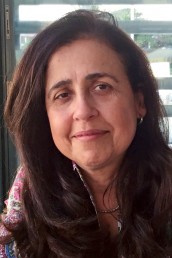Data scientist wins award to develop malaria monitoring platform
Isabel Cruz, professor of computer science at the University of Illinois at Chicago, has been named a Grand Challenges Explorations winner, an initiative funded by the Bill & Melinda Gates Foundation.
Cruz, whose project is among 28 to be funded of the approximately 1,500 proposals submitted, will develop a data integration platform to monitor and predict the location of cases of malaria over time with her $100,000 award. The data will be used to drive targeted mosquito elimination efforts.
“In order to eliminate malaria, we need to be able to accurately monitor the changing patterns of infection across an entire region,” Cruz said. “Infection rates may be affected by multiple factors including the location of health centers, temperature, rainfall, type of landscape and population distribution.”
Data integration is difficult because they come from different sources and are measured at different resolutions, according to Cruz.
“Also, monitoring how a disease changes over space and time has been particularly challenging because data integration methods are for the most part space and time oblivious,” she added.
Malaria is a mosquito-borne disease caused by a parasite and people who contract it often experience fever, chills and flu-like illness. Left untreated, they may develop severe complications and die.
Cruz will use data from Zimbabwe to develop her methods. More than 400,000 cases of malaria are reported in Zimbabwe each year, representing approximately three percent of the country’s total population. Half of Zimbabwe’s population is at risk for contracting malaria despite measures to combat the disease including through mosquito control methods and disease screening programs. Of Zimbabwe’s 63 districts, 47 consistently report cases of malaria, and 33 of the districts are categorized as high-burden malaria zones.
Cruz’s project will integrate data on malaria rates, weather patterns and population distribution from world and government sources into a standardized format.
“The data we need to track malaria comes from so many different sources that without a standardized way of integrating it so that it can be useful, we can’t really make well-informed predictions about which areas may experience an increase in malaria in the near future,” she said.
Ultimately, the sorted and standardized data will be visualized in maps and dashboards that will display patterns of malaria progression in real time.
“This information will help inform public health workers, government responders and others, as to where to target their efforts to reduce the incidence of malaria,” Cruz said.
Cruz also anticipates that her integrated data displays may allow researchers to better understand which factors influence malaria rates the most and why.
“We believe that precipitation has a big impact on malaria rates because mosquitoes depend on having standing water such a puddles, for breeding, but we don’t really know how big of a factor this is compared to other factors like temperature and land cover,” she said.
Grand Challenges Explorations is a $100 million initiative funded by the Bill & Melinda Gates Foundation. Launched in 2008, more than 1,285 projects in more than 65 countries have received Grand Challenges Explorations grants. Initial grants of $100,000 are awarded twice per year and successful projects have the opportunity to receive a follow-on grant of up to $1 million.

